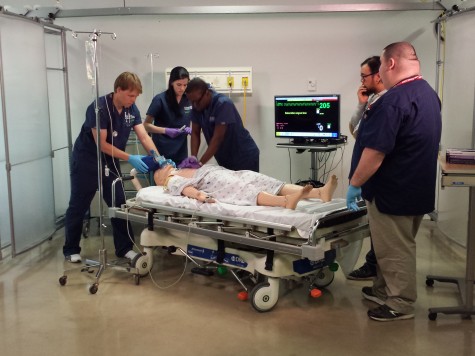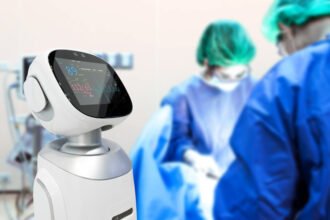 In direct opposition to last week’s tongue in cheek poke at Medical Simulation of
In direct opposition to last week’s tongue in cheek poke at Medical Simulation of
 In direct opposition to last week’s tongue in cheek poke at Medical Simulation of Olde, according to leadership and Director of MedStar SiTEL (and Human Factors Center at MedStar Institute for Innovation) Terry Fairbanks, MD, MS (@TerryFairbanks): “When the mission is patient first, you don’t try first on patients.”
In direct opposition to last week’s tongue in cheek poke at Medical Simulation of Olde, according to leadership and Director of MedStar SiTEL (and Human Factors Center at MedStar Institute for Innovation) Terry Fairbanks, MD, MS (@TerryFairbanks): “When the mission is patient first, you don’t try first on patients.”
One of the increasingly obvious missing links between patient safety and medical education is the opportunity for students to learn their skills in a safe and controlled environment–and that means safe for both patient and caregiver. Simulation offers that option, and is growing across the country, as well as at MedStar Health in the Washington DC and Baltimore areas, offering an affordable, interdisciplinary, safety-driven and effective training ground for care providers young and old.
In fact, MedStar SiTEL just achieved a milestone that sets them among the elite in medical simulation training. The group was recently granted accreditation by the Society for Simulation in Healthcare (SSH) in the areas of Teaching/Education and Systems Integration: Facilitating Patient Safety Outcomes. Achievement of this milestone required both a comprehensive application and a full-day site visit by three experts in the simulation field who had the opportunity to tour MedStar SiTEL’s Clinical Simulation Center in DC, meet with program and institutional leadership, MedStar Health’s experts in systems integration and patient safety, subject matter experts who offer education and training sessions in the simulation setting, and learners who have attended sessions at one of MedStar SiTEL’s simulation centers. The application/site visit process also provided a wonderful opportunity for MedStar SiTEL to reflect on all they currently do daily to improve patient safety, as well as to learn from experts in the field.
To date there are just 41 centers who have received accreditation by SSH. MedStar Health has had a very robust OB/GYN simulation program, led by Tamika Auguste, MD, in place for some time. In fact, we have mentioned her MOST (MedStar Obstetrical Simulation Training) program here on ETY (see The Future of Medical Education...). With the success of rolling out the MOST program across all MedStar entities with OB/GYN services, the SiTEL team is now in the process of implementing simulation education for additional disciplines across the health system, such as pediatric and cardiac critical care.
While most envision simulation training to include the lifelike, talking mannequins pictured above, some of the most critical training that occurs in healthcare simulation revolves around teamwork and communication. Because communication has repeatedly been shown to be the largest contributing factor to medical harm, the rehearsal of these skills could not be more pivotal. The debriefing that occurs after a simulation at MedStar SiTEL is key, and participants engage in the follow up discussion as though it had been an actual event. Having observed a number of simulation training exercises at MedStar SiTEL firsthand, the professionalism of the leadership team pre-event was equally as impressive as the commitment of the learners to participate as though the event was occurring in real-time. For more information on MedStar SiTEL services, click here.
Stay tuned for Stories of Simulation to come!







